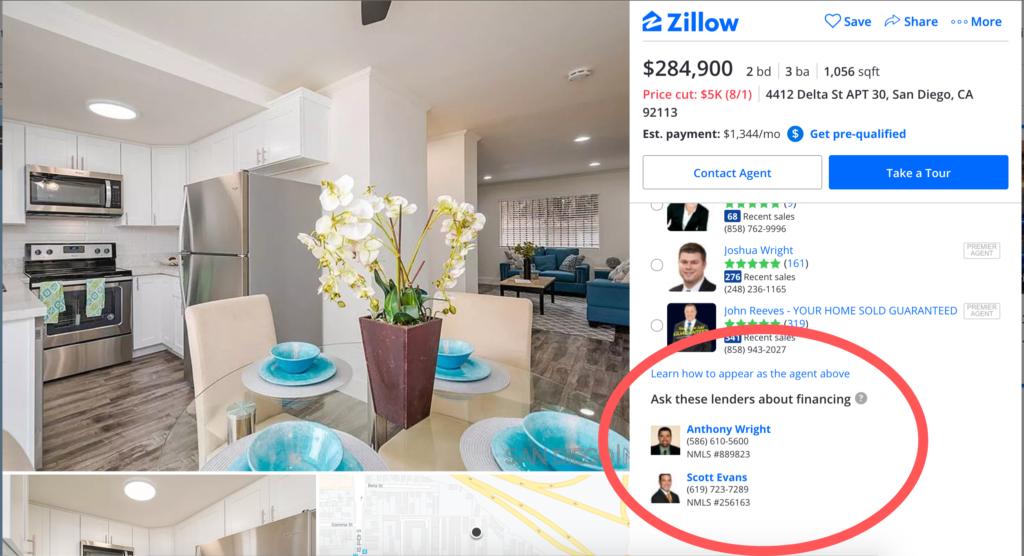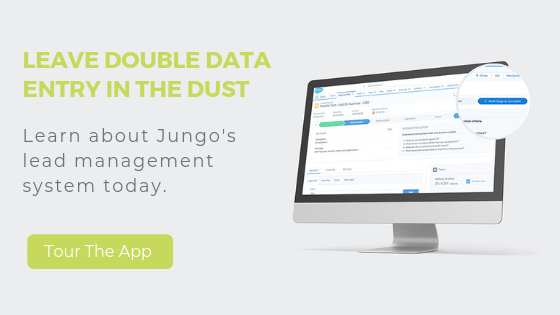

Whether you’re just starting out as a loan officer, or you’ve been in the industry for decades, at some point you’ve probably asked yourself: how should I be getting mortgage leads? For most people, there’s two main options: buy or generate.
Before we go into details about each option, here’s some background information regarding lead generation.
So, let’s get into it!
What’s a mortgage lead?
A mortgage lead is how those in the mortgage industry refer to a person who has a potential need for services from a mortgage lender or loan officer. This service could be a new mortgage home loan or even a mortgage refinance.
Not all leads are ready to buy. It’s the Loan Officer’s job to determine whether the lead is qualified and then ready.
Why are leads important?
Leads are the basis of every successful mortgage loan officer’s business strategy.
Leads become borrowers, who become closed loans, and closed loans are what earn a loan officer their commission! Therefore, a large part of a loan officer’s job is dedicated to finding, nurturing, and converting leads into customers.
How do mortgage officers find leads?
There are many ways to get leads, but the methods ultimately break down into two categories: buying or generating.
Buying leads means that you rely on another company or website to collect potential borrower’s information, and then pass that prospect data onto you.
Generating leads means that the loan officer pursues potential leads on their own. This can be from word-of-mouth, referrals, online marketing, or other “organic” ways to generate leads.
In the next sections, we’ll discuss more details regarding buying and generating leads, so if you still have questions, read on!
What are the steps to buying leads?
Buying mortgage leads is a popular option among mortgage loan officers, especially as more potential borrowers turn to the internet first for their home search.
When an interested buyer submits his or her information on a website such as Zillow, that buyer indicates that they may be interested in a mortgage or refinance.
Then, Zillow (or whatever company the data was submitted to), will then turn around and sell that lead to mortgage loan officers.
You can see what the prospective borrower may see on the image below:

What happens once a loan officer receives their leads?
Loan officers will receive third-party leads through the various methods that the service provider offers like email, spreadsheet, or a portal.
Once the loan officer receives the lead, he can start follow-up campaigns to try and convert the lead into a loan. If all goes smoothly, those borrower’s loans will be approved and the mortgages will close.
The practice of buying leads can be a sticky subject among loan officers. This is because third-party lead aggregators do not always offer exclusive access to the leads sold. So, if you buy leads for a particular zip code or demographic, you may not be the only one receiving those leads.
However, you don’t need to get discouraged by this bad press. If you think buying leads may be a good option for growing your business, educate yourself about the steps to buying leads, and the best practices to pursue after you do.
What companies sell mortgage leads?
- Zillow
- LendingTree
- TransUnion
- Bankrate
- Trulia
- Realtor.com
- The Lender’s Network
- Loanbright
- Best Rate Referrals
- Lead Planet
- Inbound Prospect
While there are many different companies that sell mortgage leads, the two giants are Zillow and Lending Tree.
When trying to decide what company to buy leads from, there are a few basic things to consider: the company’s reputation, type of lead, and price.
First, consider the company
Whether you choose Zillow, Bankrate, Trulia, or any other lead aggregator, it’s important to do your research.
What do their customer reviews say about them? Are their leads quality? Do they offer the ability to “cherry-pick” leads? Are their leads exclusive or non-exclusive? Do they buy leads from another company or are you receiving fresh leads?
All these questions and more are important to consider as you decide which company to buy leads from. Some LOs choose to buy leads from multiple companies and utilize a wider range of leads.
Next, think about the type of lead you want to buy
As mentioned above, there’s a big difference between the types of leads. For example, you could buy exclusive leads (where you are the only LO purchasing a potential borrower’s information), or you could choose non-exclusive leads.
Non-exclusive leads can be a slippery slope however, since you can’t guarantee how many other LOs also bought that lead’s data. The competition for a customer’s business is already steep without the challenge of other LOs calling them too!
This doesn’t mean you can’t be successful, however. Just make sure you have a plan to get in contact with leads as soon as they come in. Syncing the lead aggregator to your CRM and triggering an immediate workflow is your best contact strategy for this type of lead.
Determine how much you want to pay
Price is obviously a very important factor when it comes to buying leads. Be aware that many companies require a minimum deposit, which can be $500 or more.
Lead price varies from company to company, as well as what type of leads you choose to purchase. Recycled or non-exclusive leads will generally cost you less, while fresh, exclusive leads are probably going to be the most expensive option.
Lastly, decide on a follow-up plan
Before purchasing even a single lead, it’s important to have a game plan in place for how you will handle those leads. How soon will you call the lead? How many times will you call, email, or text a lead? Will you continue to stay in contact with them if they indicate that they are no longer interested, or have gone with a different mortgage broker?
These are all critical things to decide ahead of time so that you can jump on leads as soon as they come in. The chances that a lead converts are much higher if he or she is contacted immediately after the request is submitted. This means that you need to be efficient, consistent, and quick.
One of the best ways to organize your follow-up with incoming leads is to fully utilize your CRM.
With database tools like Jungo’s Lead Capture system, you won’t have to worry about double data entry. Fresh leads are automatically imported from Zillow, Trulia, LendingTree, or Informa Research Services. From there, you can automatically distribute leads to your team. Plus, automated marketing campaigns can start right away, increasing your conversion rate.
What are the steps to generating leads?
If you decide to generate leads yourself, there are many different options. In fact, we go into more detail about creative lead generation techniques, here.
Generally, however, you have three main options for generating your own mortgage leads.
1. Use Referral Partners
Referral partners, often real estate agents, are professional contacts who refer business to you. Monica Jones, a top producing loan officer, says that about 65% of her business comes from realtor partners.
Why would a real estate agent send leads to you?
The first and most obvious answer to this is that they want their clients to be able to buy a home! After all, they only get paid if a deal closes, just like you. If you have a proven track record of helping borrowers close on time, real estate agents will take note.
Another major reason that a real estate agent might choose to refer clients to you is if you specialize in certain types of loans. Perhaps you’re an expert in VA loans and highlight this skill set in your marketing. Because of this, realtors send some specific borrowers your way.
How do you prove to a real estate agent that they should send you leads?
Getting to the point where a referral partner wants to send leads your way can be a long process. So, keep in mind that it requires patience and persistence.
Focus on building a close relationship that is built on trust and helping each other out. After all, when they pass a client’s information on to you, they want them to get a mortgage too. Their business often relies on closed loans just as much as yours does!
2. Market Directly to the Customer
Recently, there has been a growing trend for generating leads among loan officers. Instead of relying on aggregator sites or referral partners, many loan officers have chosen to focus on pursuing customers directly.
Loan officers are doing this through their own online marketing. Online marketing is a very broad category of lead generation. It generally involves a variety of different strategies, including Facebook and Google Ads, newsletters, or blogs. Online marketing is growing in popularity for loan officers to attract potential customers and build their brand.
So, why is online marketing becoming so popular?
One of the benefits of online marketing is that it can often be targeted to specific types of leads. For instance, if you’re interested in first time home buyers between the ages of 21 and 39, you can target Facebook or Google ads to this demographic. This can be especially helpful as you calculate your ROI on your marketing strategies, and can lead to some highly convertible leads.
Run Your Own Paid Ads
Rather than paying a third party to aggregate leads or asking a real estate agent for a referral, loan officers are running their own paid ads to generate leads.
These paid ads take leads to a landing page which gathers the lead’s contact information.
Loan officers can then run follow-up and marketing campaigns as they would with other leads. However, since the landing page is owned by the loan officer, he or she would be the only one owning the lead’s contact information.
Share Valuable Information On Your Website Blog
Writing a blog (like this one!) is another popular option for organic lead generation among loan officers. Not only is this a great chance to brush up on your industry knowledge, your customers will appreciate your expertise!

You can also share valuable, mortgage-related content on your social media! This is another great way to build trust in your brand.
When it comes to leads, having a consistent and high quality blog will make your website stand out to Google for organic search terms. Additionally, once a lead visits your website, your valuable content will help show them that they can trust you and your knowledge.
From there, leads can choose to sign up for a blog newsletter. Now that you have their contact information, you can start the process of converting them into a customer!
It’s understandable why many loan officers rely on lead aggregators and referral partners for the majority of their business. Going directly to the customer is a lot of work! However, the longtime value of generating leads for yourself if well worth the hard work.
3. Maintain Great Client Relationships
Past and current clients can be a goldmine for leads. Many LOs choose to give a lot of attention to amazing customer service so that they are the first mortgage professional to jump to a client’s mind when someone asks them about getting a mortgage.
Potential customers trust the opinion of people they know more than pretty much any other marketing technique, which means that your clients (past and current) can be your most successful sales people.
Another go-to option for generating leads is to rely on friends and family. This can be especially helpful at the beginning of a loan officer’s career.
Does your aunt need a mortgage? Ask her to apply through you.
Does your best friend’s coworker have questions about refinancing?
Sometimes the best leads come just by asking your friends and family to keep an ear out for potential borrowers.
Should I buy or generate leads?
Deciding on what strategy you will employ to generate leads is a highly personal one. In all likelihood, your strategy will ebb and flow over time depending on what the market is doing and what success you have with each strategy.
If business is slow, buying leads may be a desirable option. However, if the market you work in is hot, then you probably have plenty of word-of-mouth business to keep you busy.
Chances are, if you buy leads, you also do some organic lead generation. However, many LOs swear by only organic lead generation as the secret to their success.
What are mortgage leads worth?
Generally, you can expect to spend between $20 and $100 on a single mortgage lead. Keep in mind that the cost to buy the lead does not take into consideration the time and effort needed to cultivate and convert those leads into borrowers. Plus, not every lead is going to convert (in fact, most will not), so don’t count on a high ROI right away with every lead you buy.
Conclusion: Tips for your mortgage lead follow up plan
We recommend utilizing a combination of techniques. Such as calling for the first touch, and then sending a follow up email or text. After that point, you can decide how soon to follow up again.
However, it’s important to stay at the front of your potential customer’s mind and use an automated lead follow up system mortgage. One of the best ways to do this is through offering value. You could set leads up on a drip marketing campaign offering advice on getting approved. Or, you could extend an offer to pre-approve them for a loan on a no commitment basis.
Offering your leads valuable resources and tools will make them much more likely to choose you as their loan officer. This is because you have proven that you value them for more than just their business.
Bottom Line
Deciding how you will get mortgage leads is much like anything in business. It’s a complicated and multi-faceted decision. Not everyone will come to the same conclusion when they consider what’s right for them and their career. You may choose to buy leads or generate them organically. Or, you may even utilize a mixture of lead generation methods, it’s important to do your research.
Once you’ve made your decision, commit to a plan, and stick to it for a bit! You won’t see results if you jump from technique to technique too quickly, so be patient. In the end, you will find a strategy that fits you and your needs.







